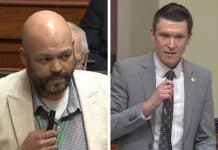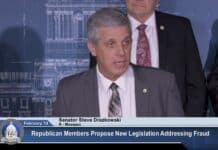
A bill at the Capitol would pump $20 Million over two-years into the Snowbate program which currently provides tax rebates for production companies to make movies and commercials in Minnesota. Current funding for the program is $10 Million over two-years.
Another bill seeks to add language to current tax law to provide for a tax credit to individuals for 25% of film production costs starting in 2015. The credit would be available, regardless of tax liability, meaning a person would see a check from the state if their credit exceeds their liability. These bills have seen action in St. Paul, despite the Minnesota legislative auditor’s recent report which determined a lack of legislative oversight and questioned the efficacy of the Snowbate program.
From auditor Jim Noble’s April 10th report on the Minnesota Film and TV Board:
We found that the Legislature has not established clear outcomes it expects the board to achieve. As a result, it is difficult to hold the board accountable for the public money it receives from the state.
Read the full report here.
The Snowbate incentive program started in 1997 after some of the most famous movies shot in Minnesota were made; like The Mighty Ducks, Grumpy Old Men, and Fargo.
Snowbates were ceased from 2003-2005 , but were reinstated in 2006 with a one-time allotment of $1.7 million.
In 2013, the DFL-led legislature and Governor Dayton approved $10 Million to fund the program for two years which was a significant increase from the $5 million in state funding over the previous four years.
Despite the money injection, no major Snowbate productions have been filmed in Minnesota since 2009. A current list of Snowbate recipients reveals that the bulk of the money goes to commercials and post-production work for large corporations like Cenex Homes, H&R Block, Honda, Big Lots, and Kohl’s. Mystic Lake Casino, Hormel, and Best Buy are local companies who have benefited and Abu Dhabi Commercial Bank out of the United Arab Emirates did post-production work in Minnesota with a Snowbate.
Other tax-funded film making incentives include the Iron Range Resources & Rehabilitation Board’s Film Production Incentive Program which is funded by taxes on mining companies, the sales-tax-funded Legacy, Arts, and Cultural Heritage Production Reimbursement Program which provides grants up to $175,000 per movie, and the Legacy-funded Independent Filmmaker Project.
The $20 Million allocation to the Snowbate program has bipartisan support in both houses. Rep John Lesch, D-St. Paul is the chief author of HF 2137
Co-authors include:
Rep Jason Metsa, D-Virginia
Rep Jon Applebaum, D-Minnetonka
Rep Tim Mahoney, D-St. Paul
Rep Alice Hauseman, D-St. Paul
Rep Joe Hoppe, R-Chaska
Rep Greg Davids, R-Preston
Sen Terri Bonnoff, D-Minnetonka, is the chief author of the Senate companion bill, SF 772
Co-authors include:
Sen Richard Cohen, D-St. Paul
Sen David Tomassoni, D-Chisholm
Sen Dan Sparks, D-Austin
Sen Carrie Ruud, R-Breezy Point
HF 2227, which would provide for the individual income tax credit for 25% of film production costs also has Rep Lesch as its chief author
Co-authors include:
Rep Erik Simonson, D-Duluth
Rep Ron Erhardt, D-Edina
Rep Linda Slocum, D-Richfield
Rep Joe Atkins, D-Inver Grove Heights
Rep Greg Davids, R-Preston
Rep Jenifer Loon, R-Eden Prairie
Rep Tim Sanders, R-Blaine
Rep Sarah Anderson, R-Plymouth
Sen Richard Cohen, D-St. Paul is the chief author of the companion bill SF 2074, there are no other co-authors in the Senate.
UPDATE: During Wednesday’s Senate Floor Session, $6.5 Million in annual funding for the Minnesota Film and TV Board Snowbate program was passed as a part of a larger bill, SF 2101, the Omnibus agriculture, environment, natural resources, jobs, and economic development appropriations bill.
The bill passed on a 37-22 vote with Republicans voting with the Democrat majority including Sen Dave Osmek, R-Mound, Sen Michelle Fischbach, R-Paynesville, Sen Carla Nelson, R-Rochester, and Sen Bill Weber, R-Luverne.
Republican Senators Julianne Ortman, R-Chanhassen, and Paul Gazelka, R-Nisswa, tried unsuccessfully to move $5 million of the funding directed to the Film Board to pay for infrastructure needs. The Ortman amendment to redirect money to a wastewater program failed 28-33 and the Gazelka amendment to move money to rural broadband failed 30-31.




